ஆதவன் தீட்சண்யா
அப்படியென்ன அதியுன்னத புல் புடுங்கப்போகிறோம்?என்ற கேள்வியுடன் மார்ச் 2012ல் தமிழ்மணம் வாயிலாக எனக்கு அறிமுகமானார் ஆதவன் தீட்சண்யா. இப்பதிவு நேற்று அவரின் பொங்காரம் என்ற கதையை வாசித்ததின் பாதிப்பு. நான் நிறைய கதைகள் வாசித்தவனில்லை, தமிழிலக்கியத்தில் புலமையுடையவனுமில்லை ஆனாலும் பொங்காரம் ஒரு சிறந்த படைப்பு என்று உறுதியாக என்னால் சொல்லமுடியும், அதற்கான காரணங்களை இனி விவரமாக பார்ப்போம்.
இக்கதையில் வட(மேற்கு) தமிழகத்தின் வட்டார வழக்கு மிக இயல்பாகவும், நுணுக்கமாகவும் கையாளப்பட்டிருப்பது, கதாபாத்திரங்களுடன் கதைக்களத்தில் வாழ்ந்த அனுபவத்தை தருகிறது. வாசிக்க ஆரம்பித்த சிறிது நேரத்திலேயே எனக்கும் இருட்டு பழகி எதெது எங்கெங்கன்னு நெப்புப்படுது. பரமன் தோள்லயும், சுப்புரு தோள்லயும் பொணம் கனக்கும் போது எனக்கும் கனத்தது. இவனையெல்லாம் இத்தினி நாள் உசுரோடவுட்டதே பாவம் என்று காளியப்பன் கொதிக்கும் போது எனக்கும் கொதித்தது. ஓங்காளியம்மன் நோம்பி செலவுக்கு எங்கப் போறதுன்னு அர்ச்சுனனோடு எனக்கும் முழி பிதுங்கியது. இன்னிக்கோ நாளைக்கோன்னு இத்துக்கெடக்கற கூரையை நினைத்து மாரப்பனோடு நானும் வெசனப்பட்டேன். அப்படியே ஆராயியோட சேர்ந்து முப்பத்தேழாவது ஆளாக நானும் கங்காணி வலையில் விழுந்தேன். மேலும் இக்கதையில் கையாளப்பட்டிருக்கும்: “இருட்ல உருட்ற குருட்டுப்பூனையாட்டம், பூசாரி பொய்யும் புலவனார் பொய்யும் சாரி பொய்யில அரைவாசியாகாது, அரசனுக்கு அவன்பாடு ஆண்டிக்குத் தம்பாடு, காத்தில்லாத வூட்ல கையுங்காலும் கட்டிப்போட்டாப்ல ஆயிருச்சு, நாட்டுக்கு ராசா மாறினாலும் தோட்டிக்கு பொழப்பு மாறலே, மீள்றதுக்கு வழி தெரியல மாள்றதுக்கும் குழி தெரியல, வலையில விழாம மீன் எங்கப்போகும் தலைக்கு வராம பேன் எங்கப்போகும்?” போன்ற சொலவடைகள் வாழ்க்கையில் எவ்வளவு இன்னல்களிருந்தாலும் அவர்களிடத்திலிருந்த கூர்ந்த அறிவையும், அழகுணர்ச்சியையும் காட்டுகிறது.
காலமாற்றத்தினால் பாட்டன் பூட்டன் காலத்துலயிருந்து பாத்த கொட்டடிக்கும் வேலையை விட்டுவிட்ட மக்கள், இன்று செய்கின்ற தொழில்களாக: ரோடு போடறது, காரைவேலை, செங்கல் அறுக்கறது, மணல்லோடு அடிக்கறது என்று ஆரம்பித்து பஸ் ஸ்டாண்ட்ல ஜோப்பு கத்திரிக்கிறது, பொண்டாளுகள் போலிசுக்கு மாமுல் கொடுத்து செய்யும் தொழில் வரை பட்டியலிட்டு, முக்கிய பாத்திரங்கள் செய்யும் ஜல்லியொடைக்கிற வேலையை விவரித்துக்கொண்டே கதையை மிக சுவாரசியமாக நகர்த்துகிறார் ஆதவன். கொத்தடிமைகளாக மாட்டிக்கொண்டு படும்பாட்டை மிகுந்த நயத்துடன் கோர்வையாக எந்தவொரு மிகையான சொற்களின்றி பொட்டில் அறைந்ததுபோல் சொல்லும் ஆதவனின் திறத்திற்கு கீழ்கண்ட உத்திகள் சான்றாகும்:
- கதையின் ஆரம்பத்தில் “…அர்ச்சுனனை கொன்னிருப்பான் உடுப்புக்காரன். தோட்டா தெறிச்சக் குழி இன்னம் வடுவாட்டம் பாறையில இருக்கு. அத பாக்கறப்பவெல்லாம் நடுங்கறான்.” என்று சொல்லி பின் “டெலிபோன் லைனுக்கு குழியெடுக்குற வேல செஞ்சிருக்கான். அப்ப அங்க சேத்திக்கிட்டு வந்த புள்ளதான்…” என்று மல்லிகாவை அறிமுகப்படுத்தி, “இன்னிக்கு என்னயத் தொட்டவனுங்க இந்த கொழுந்த கிள்ளறதுக்கு எமுட்டு நேரமாவும்னு மல்லிகா பொங்கி பொங்கி அழுவுறா. யாரு தேத்தறதுன்னு தெரியாம எல்லாக் கண்ணுலயும் தண்ணி” என்பதன் மூலம் ஆரம்பத்தில் குறிப்பிட்ட “பரணை மேல நின்னு உடுப்புக்காரன் பண்ணின அழும்பையும்”, “பஞ்சபாண்டவங்களாட்டம் மொட்ட மரமா நின்னு வேடிக்கைப் பார்த்ததின் காரணத்தையும்” குறிப்பால் விளக்குகிறார்.
- முதலில் “…சின்னசாமியும் ஆராயியும் தனித்தனி ஒண்டிக்கட்டைங்க. அதால அவங்க சாளைங்க ரண்டுலயும் சமுட்டி, கொட்லான், கிட்னக்கம்பி, சேறுவாங்கி, கெடப்பார, பிக்காசு, மமுட்டி, பாண்டல்சட்டி, புட்டுக்கூடை, மால்சட்டம் எல்லாங் கெடக்கு.” என்று வாசிக்கும்போது இந்த வரிகள் கதைக்களத்தை விவரிக்கின்றன என்று கடந்து போனேன், அதேபோல் “…சாளையிலயே வுட்டுட்டு மத்தவங்க மட்டுந்தான் வேலக்காட்டுக்கு போவமுடிஞ்சது. ஆராயி அடுப்புவேலையப் பாத்துக்கிட்டு அவளயும் பாத்துக்கறா.” என்று வாசித்த போது -இது ஒரு நிகழ்வு- என்று கடந்து போனேன் ஆனால் “…கைல குட்டக் கடப்பாரை. கங்காணி கொடல் தள்ளி கெடக்கான்.” எனும்போதுதான் கதையின் மொத்த கட்டமைப்பும் புரிகிறது.
இவை போன்ற நுண்ணிய உத்திகள் பலவும், வட தமிழகத்தின் பல ஊர்பெயர்களும், பல உணவுவகைகளும் இயல்பாக கதையினோட்டத்தில் சொல்லப்படுக்கிறது. அவை இக்கதையை எப்படி வளப்படுத்தி உயர்ந்த வாசிப்பனுவத்தை தருகிறது என்று எழுத ஆரம்பித்தால் இப்பதிவு ஒரு Mphil Thesis போல ஆகிவிடும் என்பதால் இத்துடன் நிறுத்திக்கொள்கிறேன்.
கலகத்தின் குரல்
“ஈஸ்வர அல்லா தேரோ நாம்…” (பாடல்: ரகுபதி ராகவ ராஜாராம்) என்று பாடியதற்காக
கொல்லப்பட்ட காந்தி பிறந்து/வாழ்ந்து/மறைந்த இந்தியாவின் ஜெய்ப்பூரில்
பாகிஸ்தானின் லாகூர் இசை கலைஞர்களுடன் சுசீலா ராமன் கச்சேரியில் பாடிய பாடலை கேட்ட
பின் என்னுள் எழுந்த உணர்வுகளின் பதிவு.
சுமார் பத்து வருடங்களுக்கு முன்னர் ஆனந்த விகடனில் “Salt Rain” பாடலினை பற்றிய செய்தி கட்டுரை முலமாக சுசீலா ராமன் எனக்கு அறிமுகமானார். Salt Rain ஒரு இனிமையான மெல்லிய சோகம் (melodious melancholy) இழையோடும் பாடல். அன்றிலிருந்து எனக்கு தோணும் பொழுதெல்லாம் சுசீலா ராமன் பாடல்களை youtubeல் கேட்பதுண்டு. சமீபத்தில் அவருடைய “வேல்”(Vel) பாடல் தொகுப்பினை கேட்டு உன்மத்தநிலையை அடைந்தேன். அதற்கு, சுசீலா ராமனின் பாடல்கள் என்னுள்ளே (நம்முள்ளே) உள்ள உணர்வுகளை/அனுபவங்களை வெளிக்கொண்டு வருவது தான் காரணம். தஞ்சை/திருச்சி பகுதிகளில் வளர்ந்த என்னுள்ளே காந்திய சிந்தனைகளும், இஸ்லாமிய பக்திப்பாடல்களும் அவற்றின் மெட்டிலமைந்த திராவிட கட்சிகளின் பிரசாரப்பாடல்களும், தமிழ் பக்திப்பாடல்களும் படிமங்களாக இருக்கிறது, அவற்றை “வேல்” பாடல்கள் தட்டியெழுப்புகிறது.
An Indian Journey என்ற பேட்டியில், அவர் தன்னுடைய இசை பெற்றோருடான புலம்பெயர் வாழ்க்கை ஏற்படுத்திய நான் யார் என்ற குழப்பத்தினால் உண்டான கோபத்தின் வெளிப்பாடு என்கிறார். இன்றைய உலகமயமாக்க சூழலில் இப்படியானதொரு (இசை) முயற்சி மிகவும் இன்றியமையாதது. சுசீலா ராமனும், அவரை போன்று மக்களிடையே உள்ள வெறுப்பு/பகை/வன்மம் ஆகியவற்றை கலைத்து நாம் எல்லாரும் ஒன்றே என்ற எண்ணத்தை கலையினால் உருவாக்க முயற்சிப்பவர்கள் எல்லோரும் பெருவெற்றி பெறவேண்டும்.
Related Links:
http://www.youtube.com/watch?v=S_849lVhAks <- ஜெய்ப்பூர் கச்சேரி
http://www.youtube.com/watch?v=2dq1hcvP0lw <- (லண்டன் கச்சேரி, Queen Elizabeth Hall on April 16th, 2O12)
http://www.youtube.com/watch?v=iSselNEL5dw <- கச்சேரி (இடம் தெரியாது)
http://www.mkgandhi.org/articles/gstillmatters.htm <- Why Gandhi Still Matters
http://www.youtube.com/watch?v=cP35Nx_NYYs <- சுசீலா ராமன் பேட்டி
The Gatekeepers
This post is not about the documentary featuring interviews of all surviving former heads of Shin Bet – the Israeli security agency – instead it is about how security and other similar agencies of three different countries distress people. As the above-mentioned documentary, this post’s purpose is to document plights of the people who live on the edge than accusing those agencies. These three stories illustrate the perils faced by those people from the gatekeepers.
Ranjini, a widow, who fled Sri Lanka’s brutal civil war with her two children, boarded a boat from India to Australia in April 2010. That vessel ran out of fuel and food before reaching Australian waters. Subsequently, Australian navy brought them to Christmas Island, and then they were moved to Perth, Adelaide before they were released to a community in Brisbane on April 2011. Five months later, she and her children were granted refugee status as a step towards permanent residency status. On April 2012, she met Ganesh, married and moved in with him to Melbourne. In May 2012, she and her two children were summoned to immigration office. When they met the officials, they were detained and flown to Sydney for an indefinite detention because Australian Security Intelligence Organization (ASIO) – the Gatekeepers – gave “negative assessment” to them. In life, when it rains, it pours. Yes! the next day in Sydney she found that, she was pregnant. In January 2013, she gave birth a baby boy in Villawood detention center. Since, ASIO’s mission is to keep the country as safe as it can, it will not tell why and how long it will keep Ranjini and her children in detention. In addition, it is a matter of national security so she cannot appeal and as non-citizen, she has no rights.
Santhi, a fourth generation Malaysian Tamil (also Hindu) woman lives with her husband and children. She did not have national Identity Card (IC) and no attempts to get one were successful. Her mother, Meenakshi, cleans dishes for living and her father, Jamal, was no more. Meenakshi is a Hindu who left her parents when she was a teenager then married a Muslim. Jamal spent most of his time in Jail for various reasons so Meenakshi raised kids by herself. As a result, she did not apply Identity Card for all her kids so Santhi and one other sister did not have IC where as other three siblings have IC. When, she approached officials through ruling party Politicians to get IC, they advised her to apply as Muslim because her father was a Muslim. However, she refused to do so because she was raised as a Hindu and she wants to be a Hindu. At the age of 29, she and her children did not have IC. Subsequently, it is going to affect children’s education. The gatekeepers are asking her to convert as Muslim to get IC. I heard her story in a video dated year 2010; I hope she and her children got their IC now.
The last story is about Qursaya Island located in the middle of Nile River at Cairo, Egypt. It is a common story especially in third world countries of either Asia or Africa where people first given notice to evict from the land – they live for generations – to give way for new development projects. Usually, they do not have other places to go, so they will start protesting. The gatekeepers will execute their masters’ orders forcefully for the entire nation’s prosperity; of course, the original inhabitants of that land will sacrifice for the betterment of others. The following is an interesting comment from Um Khatib – a woman live in that Island, “What revolution? This revolution has done nothing for us. The new rulers are as deaf as the old ones”. Unfortunately, in the history of human beings irrespective of period, culture, language, geographical locations or different types of governments such as democratic republic, dictatorship, military regime and single party communism –voices of people living on the edge not heard more often.
References:
http://www.youtube.com/watch?v=Ws8p-EzNA1o
http://edition.cnn.com/video/?hpt=hp_c5#/video/world/2013/02/04/wedeman-egypt-doomed-island.cnn
Sankhya
| Sankhya means perfect intelligence. By nature, perfect intelligence in its entirety never changes in other words things that do not change are perfect intelligence. We acquire partial intelligence when we either do not have comprehensive information or ignore some details so a partial intelligence keeps changing as we know more details. Since our body and all the materials in this world are continuously changing, they are partial intelligence. Our body continuously changes where as the soul never changes therefore it has the characteristics of perfect intelligence. The world and our soul emerge out of the same source then they merge back into it. God is not required to create this world and all the organisms. Soul based on its Karma abides a new body. When the soul realizes the intelligence (self-realization) that it is different from the body then it stops abiding new bodies. In other words, soul liberates from the birth and death cycle. |
In the ancient India for thousands of years, many philosophers explored to find the meaning of human life. It resulted in many spectacular revelations and philosophies. Sankhya philosophy is one of the earliest and foundational principles of all those philosophies. Kabilar composed the Sankhya philosophy when people were worshipping nature. The original 72 verses of Sankhya written by Kabilar are not available now but a few books on Sankhya are available. All the religions have their own principles about the human life as well as various things in this universe . The following paragraph briefly explains the principles of Sankhya philosophy in that regards.
The main objective of the Sankhya philosophy is to liberate human beings from this material world desires and attachments. Everybody in this world are aware of his or her own existence (have conscious) as a result, we distinguish ourselves from the selves of others. As we grow older, our body and the world around us continuously change. However, there is no change in our conscious. Therefore, our self-conscious is the prevailing truth compared to our body and the surrounding world. If we think deeply, we can clearly realize that something in our-selves creates that self-conscious and that feeling never changes. That self-conscious is the soul and it is the perfect intelligence. Since our body changes continuously, it is different from our soul and when we die the soul leaves our body. Therefore, life and soul are the same and it is referred as Purusha. Based on this principle, the Sankhya philosophy states that the Purusha and world emerge out of the same source known as Prakiruthi and it is innately a perfect intelligence. Even though this world and Purusha are emerged out of Prakiruthi, the world changes continuously but Purusha never changes ultimately both merge back into Prakiruthi. Besides this main principle, there are 25 important principles (known as Sotasakanaghkal) explaining about the five senses (sound, touch, light, taste and smell) and the corresponding organs as well as three different feelings (happy, sad and unmoved) that we perceive in this world. Based on these three feelings, Sankhya classifies all the objects in this world into three categories namely Rajasam, Thamasam and Sathuvam. Interestingly, the ancient Indian medical practices also classify things in nature into three categories Vatha, Pittha and Kaba.
Another interesting principle of Sankhya philosophy is the difference between body and life. Life is not created from the body. Similarly, body is not created from the life. From the materials (such as five elements and organic compounds) found in this world, body is created. In that context, those materials are called as Prakiruthi then in order to differentiate it from the source of those materials and soul, Sankhya refers the source as root Prakiruthi. Birth and death is only for the body not for the Purusha but it remains as a witness to all of changes to the body as well as its surroundings. In addition, Purusha enables the body to experience (and consume) worldly materials in other words Prakiruthi (not the root Prakiruthi) uses Purusha as a tool to experience and enjoy this world. During that process, Purusha caught into an illusion (known as Maya) that it is experiencing all feelings then (wrongly) identifies itself with the body. As a result, Purusha starts accumulating inevitable results (rewards or punishments) known as Karma. These Karmas keep Purusha as a germinating seed so that it sprouts again in another body after the death of one. Purusha’s birth and death cycle is the effect of its Karmas. The rigors of spiritual practices (such as Yoga) fry the Purusha as if the fried seed cannot germinate, Purusha will not abide a new body.
Sankhya philosophy clearly says that rigors of spiritual practices decimate the effects of Karma and that is the only way for Purusha to liberate from the birth and death cycle. However, there are not many details on those spiritual practices because either most probably, those details are lost like the original 72 verses or it is the shortcoming of the Sankhya philosophy.
– Translated from the Tamil book authored by Sri Ghanajothi Sambanghi
Virumaandi
Virumaandi is a guardian spirit worshiped by certain communities in southern Tamilnadu, India. This post chronicles the similarities between the World Chess champion’s (Vishy Anand) life events and the events described in folklores about Virumaandi.
According to folklores, Virumaandi agrees for a race to save people of Karumaathurkadu from Paeikammann’s annoyances. As per the terms of the race, target flags will be placed in surroundings of Meenakshi temple at the nearby city (Madurai, Tamilnadu) and whoever first brings back their flag is the winner. If Virumanndi wins then Paeikammann should never annoy the villagers. Paeikammann conspires so that a lame horse is given to Virumaandi for the race. However, Virumaandi – the true champion – defied the odds by collecting his as well as Paeikamman’s target flag.
April 16, 2010, when Vishy (Vishwanathan Anand) – the World Chess champion – stranded in Frankfurt Airport due to the volcanic ash cloud from Iceland, he did not know that he embarked in a journey to showcase what he is made of. European airports including the Frankfurt Airport started canceling flights when Vishy along with his team (Aruna, his wife, is the manager) checked-in their luggage and waiting to board the flight to Sofia, Bulgaria for World Chess championship match against the Bulgarian Veselin Topalov. Upon hearing the news, Aruna worked with the Airport officials to track down their luggage so that they can explore other means of travel. Unfortunately, there were not many choices because train tickets are all booked already and it was not possible to get the transit visas for those many countries in a short notice. Finally, on April 18th when they realized that reaching for the championship on time is impossible, requested the world chess federation and Bulgarian organizers to postpone the contest three days so that Vishy could reach there by bus and get enough rest to be ready for the match. The Bulgarian organizers rejected the request citing that it would affect all the other guests and spectators travel arrangements but the world chess federation postponed the event 1 day citing that not only Vishy even the match officials and referees could not able to reach there as per the schedule. Eventually, Vishy after 40 hours of (rented luxury) bus travel with the support of his team and fans beat Veselin Topalov and retained his world championship.
Last month, Vishy faced different challenges to defend the 2012 championships held at Moscow, Russia. Leading to the championships, during the past six months the band of his critics thrash talked about him in the media that he is ageing; he lost the form due to his one-year-old child etc. Day before the last tie breaking match, Sergei Smagin – Moscow chess federation vice president – made the following derogatory comments about Vishy “he is in terrible shape… demonstrating a tremendous lack of confidence…”. Again, Vishy overcame all these to beat Boris Gelfand and retained his world championship.
Thus, “Vishy” Anand like Virumaandi proved that the true champions win by overcoming any obstacles. They do not give up even when they are treated unfair. They thrive in those situations by converting the challenges and anger as fuel for their victory. One day, may be in the next championship, Vishy may lose but he will remain forever as a legend in the hearts of many.
Moral Responsibility
Two weeks ago, I watched CNN.com’s video clip about the meeting of U.S Senators John McCain and Joe Lieberman with Syrian opposition. The following are quotes from that video clip:
Lieberman: They are patriots, they are not extremists.
McCain: It is not a fair fight, it is not a fair fight and don’t we some point say enough of the slaughter.
McCain: Communication equipments do not do very well against helicopters, tanks and artilleries.
Lieberman: We got a moral responsibility here, the whole world does. We cannot just standby and just watch people being slaughtered. Hopefully, we progress from that point of world history.
McCain: They want weapons and ammunitions. They don’t want us there; they want opportunity to defend themselves and their families.
The following are some screenshots of the video and the link for the video is: http://www.cnn.com/video/?hpt=hp_mid#/video/bestoftv/2012/04/11/ac-mccain-lieberman-syria-responsibility.cnn.

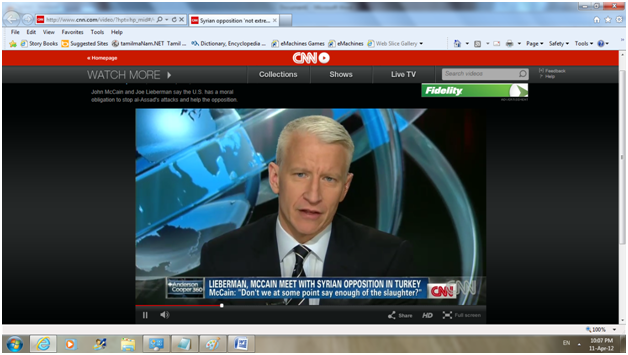
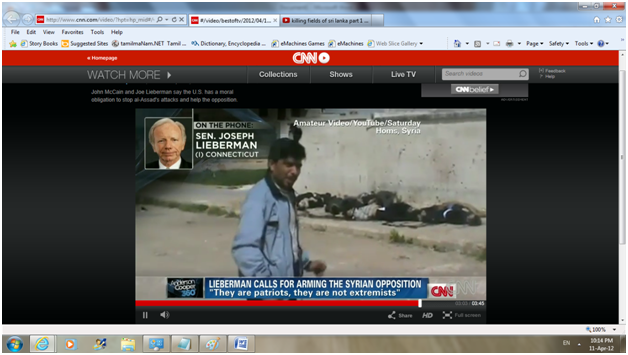
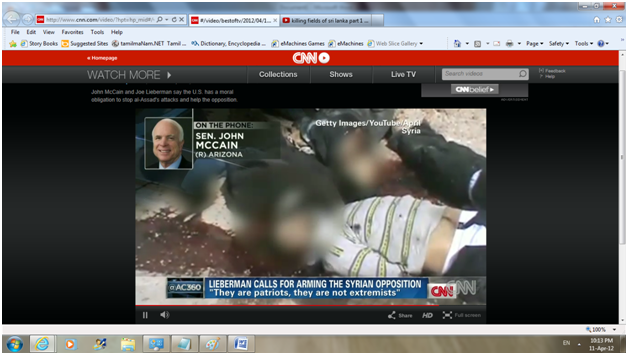
After 1983 riots in Sri Lanka, India felt the similar moral responsibility that Mr. Lieberman referring and gave weapons, ammunitions and training to the Sri Lankan Tamils to defend themselves. The civil war lasted over 25 years until May 19, 2009 with lots of killings and betrayals. This post is about the final days of the war to raise questions on what mistake those people did to go through those sufferings.
A month ago, United Kingdom’s Channel 4 released a documentary about the final days of May 2009 Sri Lankan civil war, which is a sequel to the documentary that they had broadcasted a year ago. They timed (?) the part 2 video release well to coincide with the timing of UN Security Council’s resolution voting on Sri Lanka’s war crimes. The video (part 1) starts with interview of a UN staff who worked at the Tamil area during early 2009 and then shows video footages shot at the UN office at Northern Sri Lanka on the day they left the Tamil area as per the orders of Sri Lankan government.
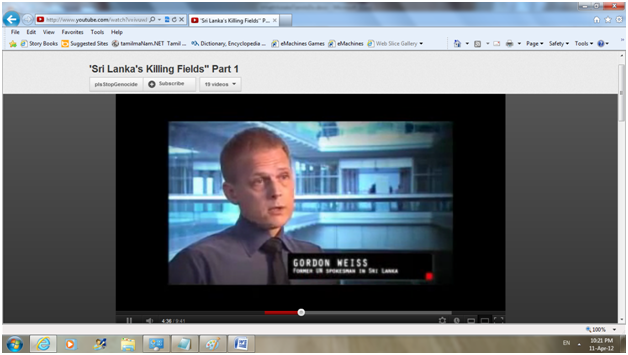
The following screenshots show the people gathered in front of the UN office when the Staffs were ready to leave. All those people were shouting and chanting at UN staffs that do not leave.
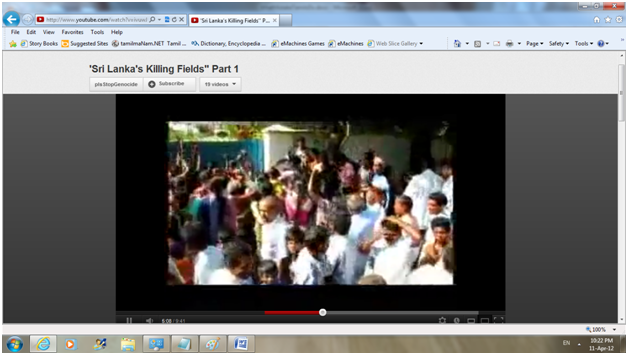
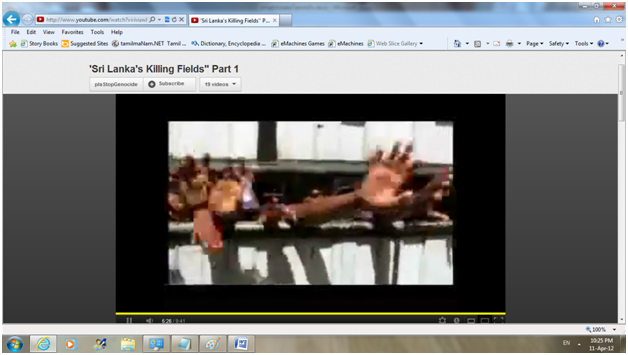
The girl in the following screenshot was neither chanting nor waving the hands like others. She was just still with extreme sadness in her face.
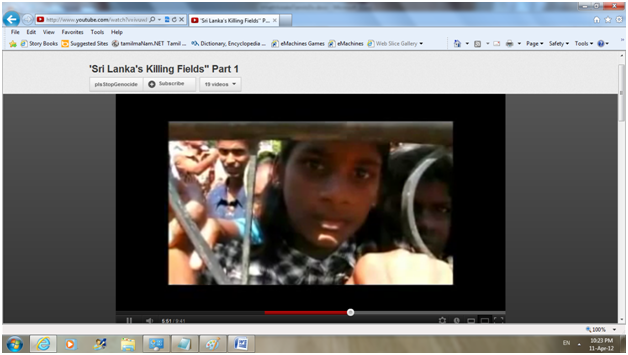
The old man shown in the following screenshot given opportunity to express the gathered people demand, he says, “Please don’t leave, we don’t need food, medicine or shelter”. He was requesting them to stay and be a witness for the things that were coming and mentioning that their death was near their throat.
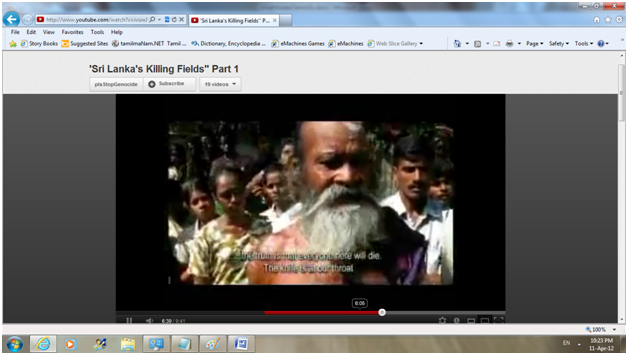
The UN worker who shot the above video is shown in the below screenshot.
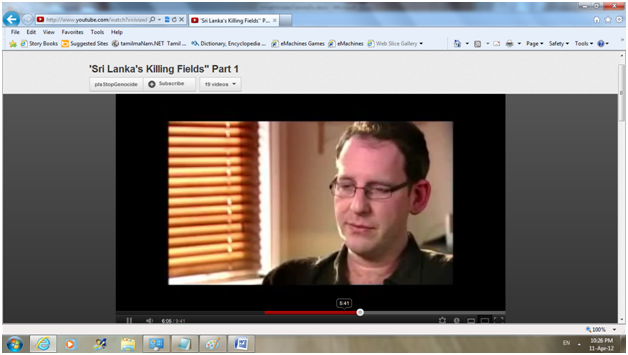
Finally, the UN staffs were leaving.
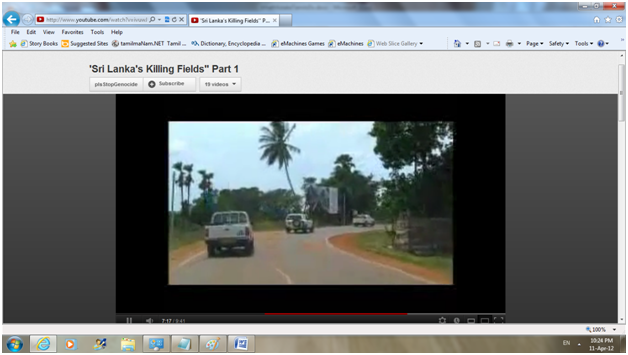
These things raise the following questions:
- Did he share the video clips (especially the girl’s face to National Geographic?) to any of other colleagues?
- Did anybody in UN office felt the similar Moral responsibility mentioned by Mr. Lieberman?
- What is the role of UN and international community in those situations?
- Even they left due to the local government’s orders or advise that their safety is not guaranteed, why after leaving they did not do anything either from New York or any other place?
- Do the entire 2 million people affected by the 2009 Sri Lankan war or the about 40,000 people who died during the final days deserve that according to UN?
- Why he did not give the video clips to media immediately, at least posted it in YouTube?
- Why and when he gave that video to channel 4?
After those scenes, the Channel 4 videos show more and more executions, slaughtering and people sufferings. Especially, the following two screenshots of the woman – identified as Isaipriya – who was an anchor in Tamil news channel, explains the reason for sadness in the Girl’s face in front of UN office. Like the “Blue bra” girl, no mainstream media talks about either the thousands of women who died in the war in the most derogatory manner (like Isaipriya) or the silent sad girl. I guess it may be because in any of those two pictures there is no Bra found.
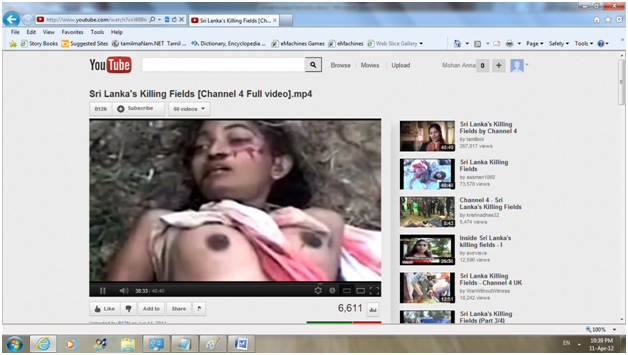
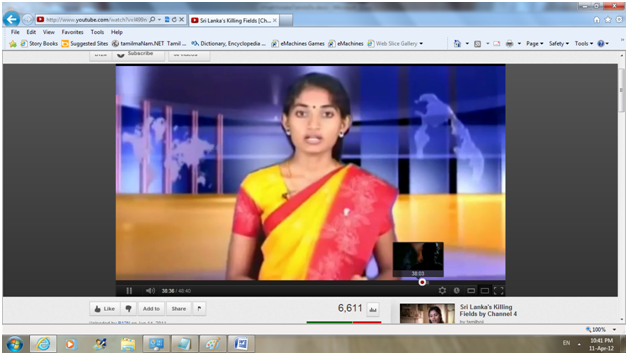
The following screenshots in the Part 2 of the Channel 4’s documentary raises even more questions that I will write in my next post.
The Tamil militia’s supreme commander family photo:
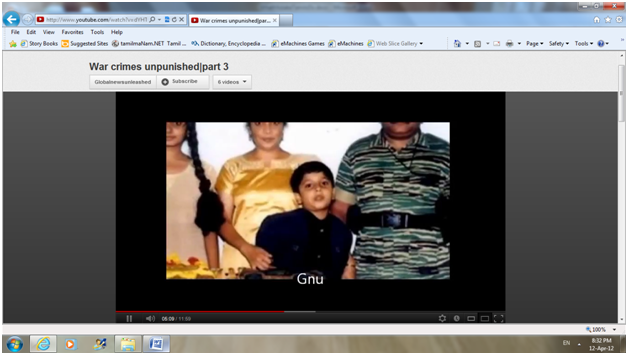
The supreme commander younger son – Balachandran – body.
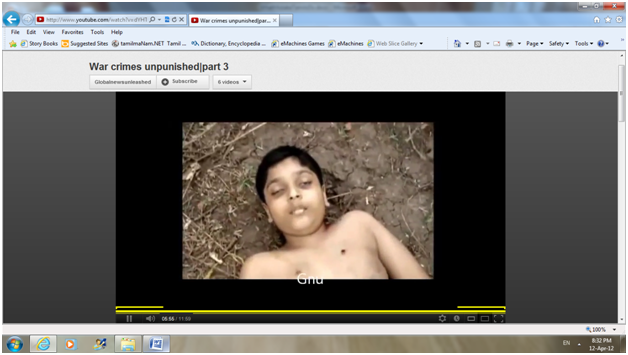
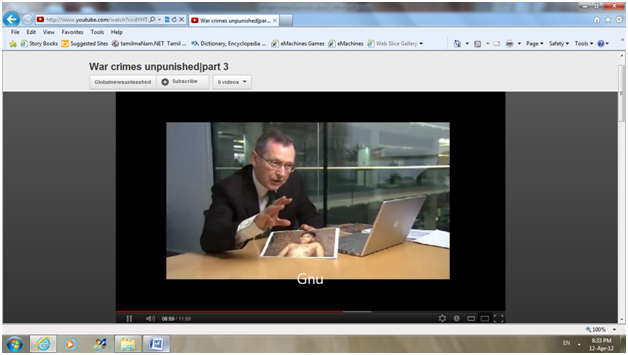
The supreme commander’s body (some said the following are fake).
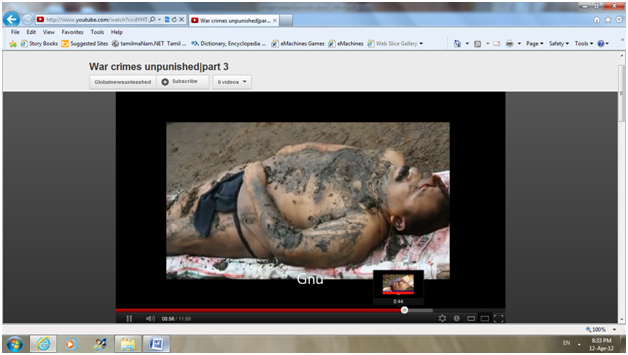
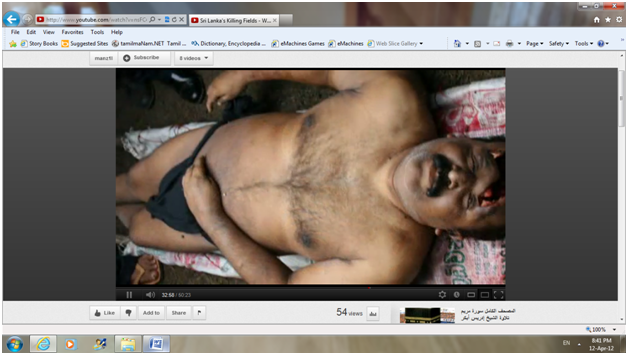
Tips for Technical writing in English
Recently, my friend asked me to review some technical document and requested me to give some suggestions to improve it. The following paragraphs are my response. The paragraphs titled as Original Version are from the received document and the rest of them are my comments and suggestions.
Original Version
This summary provides a description of the Proposed Service offering from ABCSoft to XYZSol.
The service offering includes:
- Technical Support Services with (ABCSE) ABCSoft certified Engineers
- Logging and Reporting
- POC for ABCSoft Products
- Vulnerability Assessment
Objective is to enable ABCSoft Customers and Partners to get most from ABCSoft products after the initial sale and installation. ABCSoft specializes in Information Technology with specific focus on Technical Support Services and Cloud based POC as a service offering, these services include support from ABCSoft certified Engineers and Lab resources, which could be remotely accessed over the cloud to do demos/POCs. ABCSoft offers years of professional experience and expertise while providing a low cost solution to solving your network security support needs.
My Version
ABCSoft specializes in Technical Support Services and Cloud based Proof of Concepts (POCs) as a service offering with emphasis on enabling ABCSoft customers and partners to get most from ABCSoft products after the sale and installation. This summary describes ABCSoft’s proposed service offering to XYZSol.
The service offering includes:
- Technical Support Services with ABCSoft certified Solution Engineers (ABCSE)
- Logging and Reporting
- POC for ABCSoft Products
- Vulnerability Assessment
These services include support from ABCSoft certified Engineers and Lab resources, which could be remotely accessed over the cloud to do demos and build POCs. ABCSoft offers years of professional experience and expertise to your network security support needs with competitive prices.
Reasons for my changes
Always use full form during first time followed by acronym, subsequent occurrence can be just acronym. In this case, the acronym POC is used without full form.
The word Objective in the last paragraph of the Original version was bit confusing. I guess it mentions about the proposed service offering’s objective however the words chosen for that sentence are more appropriate to describe the objective of ABCSoft.
I am not sure demos and POCs are interchangeable. To my knowledge, you build Proof of Concepts to demonstrate the capabilities. It was bit confusing.
The words like “low cost” don’t give desired feeling to the customer, it sounds like “cheap”. Instead competitive will be a good word.
Original Version
We provide business aligned security solutions by combining the widely accepted IT best practices, models and standards using the perspectives of people, process, technology, organization, and integration. Our approach starts by having an unambiguous understanding the business strategy and we follow a structured way to define and categorize the enterprise process, technology and capability requirements.
However for any enterprise to successfully execute the business strategy, information security plays a key role in ensuring that strategic capabilities are securely planned, developed, and implemented. We obtain a thorough knowledge of security requirements, risk assessments and risk management. As Information security management system is our primary objective, we implement a security policy, its objectives and activities reflect the business objectives of the organization.
My Version
We provide business aligned security solutions by combining the widely accepted IT best practices, models and standards using the perspectives of people, process, technology, organization, and integration. Our approach is, first understand the business’s strategy clearly then follow a structured plan to define and categorize processes, technologies and capability requirements.
Information security plays a key role in any enterprise to successfully execute the business strategy. It ensures that strategic capabilities are securely planned, developed and implemented. As Information security specialists, we have thorough knowledge of assessing and managing security risks and our mission is to implement security policies that align with the objectives of the organization.
Reason for changes
The problems in the above two paragraphs are grammar and usage of words, especially the order of the words. English language prescribes a natural order for words in a sentence. Unfortunately, the natural order of words in English and Tamil (other similar languages) are opposite. Therefore, our writings (most of the time) will have confusing order of words. For example, look at this simple sentence: John practices Karate every day. Here the verb – practices – is sandwiched between two nouns. It is the natural order of words in English but in Tamil verb usually goes to last. If you follow this rule it will be easy for the reader to find what the subject is, what the verb is and what the object is. Once the reader identifies these three (subject, object, and verb) then it’s easier for them to understand the sentence. For example, consider the following 3 sentences:
- John practices Karate every day to keep fit.
- John stays fit by practicing Karate every day.
- To stay fit, John practices Karate every day.
The 3rd sentence is a perfect sentence; still do you like the 3rd sentence? In my opinion, it is bit confusing because you cannot clearly identify which is Subject and which is object.
Speaking the Truth to Power
Marie Colvin stated “Speaking the Truth to Power” as the mission of a war correspondent in her address to commemorate journalists, support staff and cameramen who had lost their lives during conflicts at a service held in the St Bride’s church on November 12th, 2010. About a year later – on February 22nd, 2012 – she was killed while serving the mission in Homs, Syria. This post is not an obituary but a tribute to her and the mission.
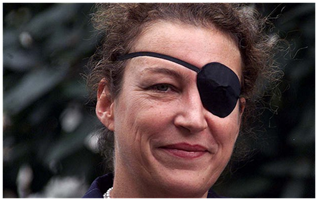
Marie Colvin
The appropriate meaning for “Power” in the mission statement is the citizens because as a journalist she wanted to report the truth to citizens who are the most powerful authority of any democratic country. When the majority of the citizens unite, the power that’s been generated is unimaginable but as we all know people are divided based on various elements such as race, class, religion, ideology etc. In addition to that, different forces in the society such as selfish corporate executives (including media owners), politicians, and government officials keep people divided so that they cannot realize that power. I am not saying 100% of above-mentioned persons are like that, I guess you know what I mean. Marie should have been aware of these facts, but she continued her mission after losing one eye in Northern Sri Lanka while covering the humanitarian disasters in the Year 2001. The level of commitment and bravery she demonstrated by continuing her mission is phenomenal and describing that through words is impossible. However, I want to share these events in order to describe her courage and the background in which she served the mission.
Marie Colvin on Monday, May 18, 2009, at 5:30 a.m., called UN Secretary General’s chief of staff – Vijay Nambiar – in Colombo, Sri Lanka to relay a message that she had received from members of the militias who were surrounded in a bunker with 300 loyalists including women and children. According to Colvin, they were ready to surrender to Sri Lankan government troops and they wanted Nambiar be present there to guarantee their safety.
Vijay Nambiar told Colvin that he had been assured by Sri Lankan president that those who gave up would be safe if they were to “hoist a white flag high”. When Colvin suggested that Nambiar should go personally to witness the surrender, he told her it would not “be necessary” and that “the president’s assurances were enough”. In addition, his brother Satish Nambiar, at the time was working as an advisor to the Sri Lankan military. Hours later the lifeless bodies of dozens of militias including the two men who told Colvin that they were ready to surrender, were put on display. A few months later, General Shavendra Silva whose Division 58 was in charge on the day of above incident was appointed as UN’s Senior Adviser on Peacekeeping Operations.
According to her, understanding and accepting these realities are not difficult but the real difficulty is having faith in humanity to believe that enough people be they government, military or the man on the street, will care when her report reaches the printed page, the website or the TV screen. I wish one day enough people care about her stories and the mission in order to stop war and realize the imperatives of peace.
References:
http://www.salem-news.com/articles/february222012/lanka-surge.php
Related links:
http://www.bbc.co.uk/tamil/multimedia/2012/02/120226_mariebanda.shtml
http://www.cnn.com/2012/02/22/world/meast/syria-journalist-amanpour/index.html
Raja Yoga
Majority of people in this modern world know that the word Yoga represents activities (postures and meditation) which improve one’s physical as well as mental health. However, people get confused or unable to differentiate when they come across different words like Raja Yoga, Hatha Yoga, Power Yoga, Vinyasa Yoga, Bikram Yoga and Astanga Yoga etc. The following paragraphs provide Raja Yoga’s overview and background, also a brief history on how various practitioners – known as Yogis – interpreted and recited it.
The Yoga Sutras of Patanjali makes up the foundational text of Raja Yoga. In the Yoga Sutras, Patanjali prescribes steps to quiet one’s mind and liberate the spirit. Raja Yoga aims at controlling all thought-waves or mental changes. It starts with postures (asanas) and breathing techniques (pranayamas) as a preparation for the meditation and concentration that enable controlling of the mind. The opinion of most scholars is that Patanjali was not the author of Yoga. Instead, he was a great expounder who interpreted various techniques that existed before and set them forth point by point.
In ancient India, the word Yoga is associated with meditative practices in Hinduism, Jainism, and Buddhism. Specifically, the word yoga is used to refer one of the six orthodox schools of Indian philosophies (Sankhya yoga, hatha yoga, jnanayoga, bhaktiyoga, etc.). The Yogis of Sankhya School of philosophy researched to understand secrets of human beings. In other words, they pursued for self-realization (Who am I?). As a result, they propound theories on human being’s physical body and metaphysical elements such as mind and life (spirit). The Raja Yoga or Yoga Sutras of Patanjali emerged from those metaphysical theories.
In the 15th-century, Yogi Swatmarama introduced the term Raja Yoga to distinguish the school based on the Yoga Sutras of Patanjali from his school known as Hatha Yoga. His school – Hatha Yoga – is based on various texts (including Yoga Sutras of Patanjali) and his own yogic experiences. Following the same path, various Yogis created different schools of yoga, as a result, there are an array of disciplines as listed above (Vinyasa Yoga, Astanga Yoga etc.). The term Raja Yoga is also used as the title of an entirely unrelated practice by the Brahma Kumaris and Prajapita Brahma Kumaris.
What will I do…?
Oscar Wilde’s quote – “We are all in the gutter, but some of us are looking at the stars” – tells you to try your best no matter what, then rewards will follow. Marichelvam – a high school graduate – from an angler family in a small village located in southern (most) India proved that the above-mentioned quote is true not just a wit or sarcasm. His achievement in the 2011 statewide High school examinations and the manner that he achieved is unbelievable, breathtaking and above all it delivers the message “do not complain, stay focus”. In this post, we will see Mari alias Marichelvam’s achievement, the challenges he faced (is facing) and what it means to me.
During third week of May 2011, a bunch of Mari’s classmates came to his house, lifted him and screamed with joy “Mari you scored 490 out of 500 and you are the District first.” Why he did not go to see the statewide High school exam results? What is the reason behind the fact that he was busy with helping his mother to collect firewoods and turning them into coal? Mari’s father worked as a labor in fishing boats, and he wanted Mari to study well so despite his medical conditions (brain tumor), he insisted Mari to continue studies. Unfortunately, two months before Mari’s statewide high school exams, his father died because of brain tumor. When Mari decided to quit his studies to help his mother to win bread and take care of his elder sister, his mom advised him to continue studies. In addition, she sent Mari to his eldest sister’s house to stay and study with more focus. His eldest sister and her husband (brother-in-law) always helped Mari’s family in all regards and encouraged him to continue his studies. When two of his exams over and he was preparing for his Math exam, his eldest sister had heart attack and died on the way to the hospital. His brother-in-law, returned to home with his eldest sister’s body, told him “we will delay the funeral so you continue to prepare and finish the Math exam”. Mari spent the night besides his eldest sister’s body preparing to Math exam and he attended his eldest sister’s funeral after finishing the exam. When he came back from the funeral, he continued to prepare for the next day Science exam and then the following day he finished his social studies exam also. He scored 100 out of 100 in Math and 99 out of 100 in Science. I have no words to describe his achievements, scoring 100 and 99 in Math and Science respectively is an extraordinary achievement, but the manner that he achieved is an unheard event. In the history of humankind did anybody achieved this feat?
Let us see the background and the challenges Mari faced (and continues to face) in his life. Mari lived in a small village located at a coastal district called Ramanathapuram district with one sister (two other sisters were married) and parents . His father worked as a labor in fishing boats that fished in Gulf of Mannar. Like Gulf of Aden, Gulf of Mannar is one of the most dangerous places due to Sri Lankan navy’s frequent and unjust attacks on Indian anglers. In addition to this hazardous working condition, his father also suffered from brain tumor, despite all these, he insisted Mari to study well. His eldest sister who was middle school topper like him could not able to continue her studies due to social and financial reasons. However, she and her husband supported his family financially. Unfortunately, Mari lost his father and the eldest sister before the exams. Mari also suffers with severe headaches for the past two years due to a heart condition, which can be cured by a surgery and the doctors advised him to wait for that surgery until he turns 21. Even though, everybody regards (including me) him as an achiever, he considers himself as a sinner because while everybody was grieving for his sister’s death, he was preparing for exams. He still cannot able to get over that fact and weeps frequently.
What I learn from his life, in other words what it means to me? Besides, it is breathtaking, unheard and unbelievable etc; it rises following questions. What I did so far in my life? What will I do when I face these kinds of challenges? Am I going to look at the stars like Mari? On the other hand, am I going to complain about the gutter’s filth and stinkingness? I am not sure, but I decided to stop complaining.
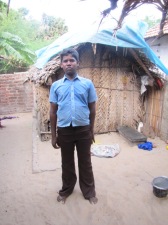
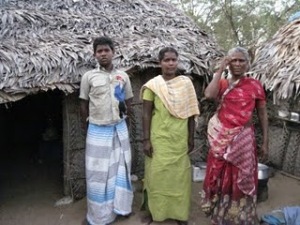
leave a comment